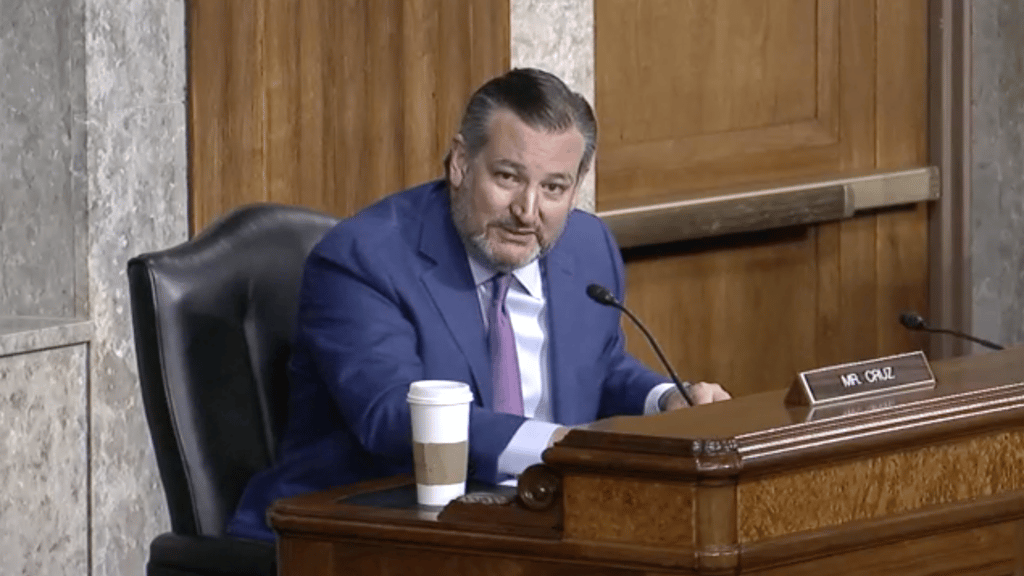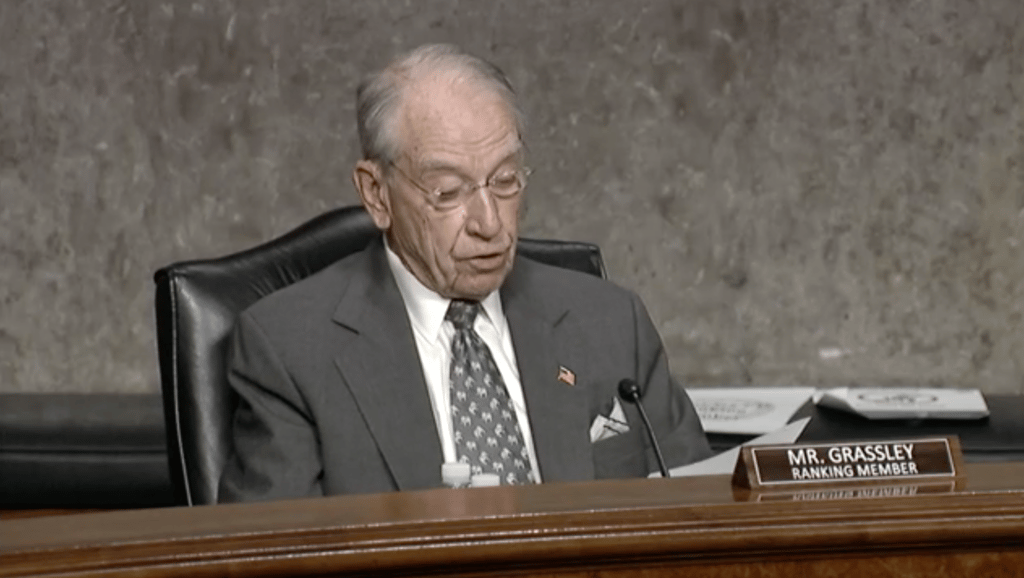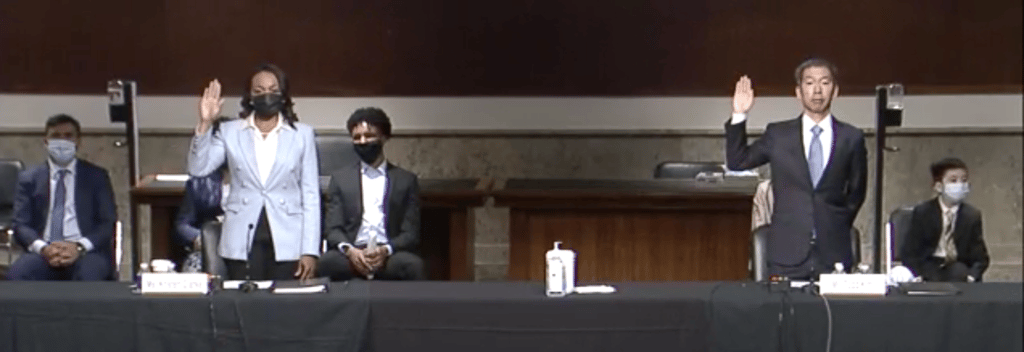WASHINGTON (CN) — From her satiric essay about racial superiority to her name on a flyer about how the "prison industrial complex" eats up Black Americans, Kristen Clarke's student interests were dominant issues Wednesday as the Senate Judiciary Committee dug into her nomination to oversee civil rights prosecutions at the U.S. Department of Justice.
“You seem to argue that African Americans are genetically superior to Caucasians — Is that correct?" Senator John Cornyn, who is white, asked Clarke, who is Black.
The Texas Republican was referencing an editorial column that Clarke co-wrote for the Harvard Crimson when she was 19.
In what was a mantra for the nominee at Wednesday's hearing, Clarke denied the interpretation, noting that her op-ed came out in 1994 — the same year that Charles Murray published his flagship exploration of racial differences in IQ scores, "The Bell Curve."
Much like Jonathan Swift urged poor Irish families to cannibalize their babies in 1729, Clarke explained that her essay was satirical. “There’s contemporaneous reporting from that time, from that day," she testified Wednesday, "that make it clear that these are not my views, senator.”
Five years later, as a law student at Columbia University, Clarke helped organize a conference called “Race-ing Justice: The Prison Industrial Complex v. Black America.” Workshops at the conference delved into the political significance of legal cases like those of Assata Shakur and Mumia Abu-Jamal, who’ve both been accused of murdering police officers.

Senator Ted Cruz brought up the conference Wednesday to ask whether Clarke supported “convicted cop-killers" as “political prisoners.” But Clarke pointed out that the conference was organized by her mentor, the late historian Manning Marable, who led the Institute for African American Studies at the time.
“I was a student providing support for the institute, working on a range of projects," Clarke said. “No, I do not celebrate the loss of life in any sense,” she said.
Beyond Clarke's student years, however, Republicans brought up more contemporary issues in an attempt to portray her as an activist unfit for the position to which she has been nominated by President Joe Biden.
Several committee members referenced a Newsweek article Clarke wrote during the George Floyd protests last summer, in which they claimed that she advocated for transformative criminal justice policies to tackle police misconduct.
"We must invest less in police and more in social workers,” Clarke wrote, resolutely.
Clarke backed away from that proposal Wednesday, repeatedly stating that she “does not support defunding the police.”
Senate Republicans pounced on this apparent about-face.
“Do you advocate diverting some of the current funding for police for other purposes?” asked Senator Cornyn.
“I didn’t have the power of the purse behind me,” Clarke responded, “so I talked about a way to allocate a limited budget of resources in a way that’ll ensure that police are able to do their jobs more effectively and ensure community safety.
“I’m pleased and excited that President Biden has committed $300 million new dollars to cops, and that we’re now in a world in which we’re working with more resources to tackle these problems,” she said.
Later, Senator Cruz quoted directly from the op-ed, highlighting a line where she described defunding the police as a “unifying call from the Black Lives Matter movement.”
“Do you really believe defunding the police is a ‘unifying call’?” he asked. “I’m reading from your article. Do you disagree with your article?”
“I don't support taking resources away from police and putting communities in harm’s way,” Clarke reiterated.
She later explained to Senator Alex Padilla that she didn’t choose the article’s headline, and the slogan was chosen because it was well-suited for that moment in politics. “I often defer to editors I work with on choosing titles,” she said. “They often have good judgement on a title that will help ensure that your thoughts and ideas get read.”
In this instance, she argued, the editors failed her. “It’s not a title that aligns well with the piece," Clarke said.
Clarke also denied that there was anything provocative about her involvement in a voter-intimidation case that sprang from the 2008 general election when a group calling itself The New Black Panther Party stood outside of a polling place in Philadelphia wielding a billy club.
Shortly after members were charged with voter intimidation in 2009, Clarke met with Justice Department officials in her capacity as a representative for the NAACP Legal Defense Fund. The Justice Department quickly dropped the case.
“I did not engage in any advocacy around that case, if that’s what you’re asking, senator,” Clarke said in reply to Senator Mike Lee. “I did communicate with people regarding public information, publicly available information about the case.”
-

Republican Senator Ted Cruz interrogates Biden administration appointees at a Wednesday hearing of the Senate Judiciary Committee. (Image via Courthouse News) -

Todd Kim, an environmental lawyer tapped by President Joe Biden for a directorship at the Department of Justice, testifies at a Wednesday hearing of the Senate Judiciary Committee. (Image via Courthouse News) -

Republican Senator Chuck Grassley reads his opening statement at a Wednesday hearing of the Senate Judiciary Committee. (Image via Courthouse News) -

Kristen Clarke and Todd Kim, attorneys tapped by President Joe Biden for a directorship at the Department of Justice, are sworn in at a Wednesday hearing of the Senate Judiciary Committee. (Image via Courthouse News) -

Democratic Senator Dick Durbin speaks at a Wednesday hearing of the Senate Judiciary Committee. (Image via Courthouse News) -

Democratic Senator Cory Booker poses questions to Biden administration appointees at a Wednesday hearing of the Senate Judiciary Committee. (Image via Courthouse News)
Despite the hostility on display, her nomination was not without supporters.
“Clarke is the person the attorney general wants us to send him to lead the Justice Department’s Civil Rights Division,” said Senator Dick Durbin, the committee's Democratic chair. “She is the person who can restore the Civil Rights Division to serve all the American people.”
Clarke's hearing — delayed after weeks of silence — was held jointly with another of Biden's nominees, environmental lawyer Todd Kim, who has been tapped to lead the Justice Department's Environmental and Natural Resources Division.
Members put a handful of questions about environmental protections to him. Senator Alex Padilla, for example, asked Kim to comment on how he would tackle a case like Exide Technologies abandoning its battery recycling plant in Vernon, California. Kim replied more broadly that he would consult with career lawyers and subject matter experts “to ensure that every enforcement decision, whether criminal or civil, would be based on the facts and the law.”
Subscribe to Closing Arguments
Sign up for new weekly newsletter Closing Arguments to get the latest about ongoing trials, major litigation and hot cases and rulings in courthouses around the U.S. and the world.









